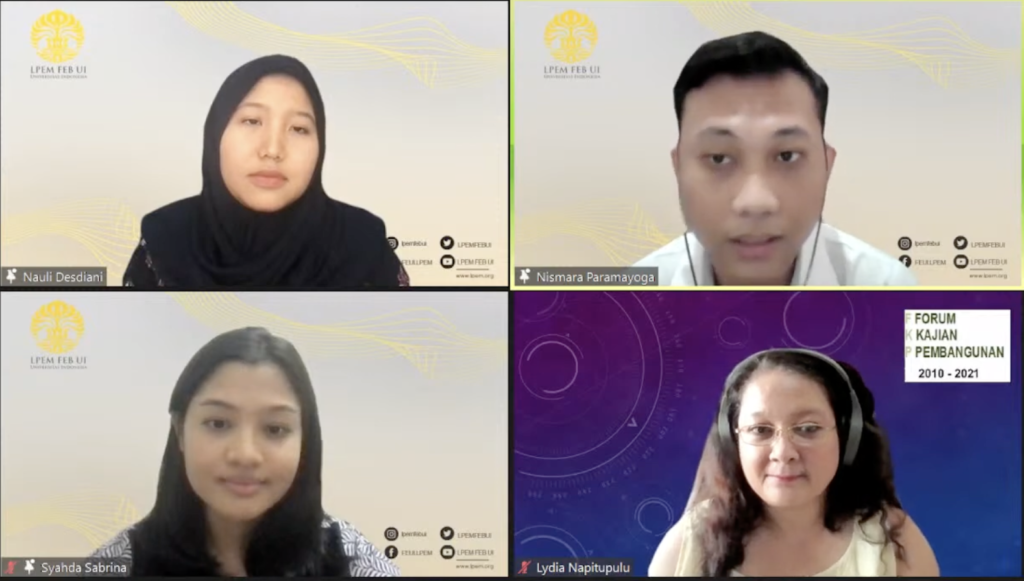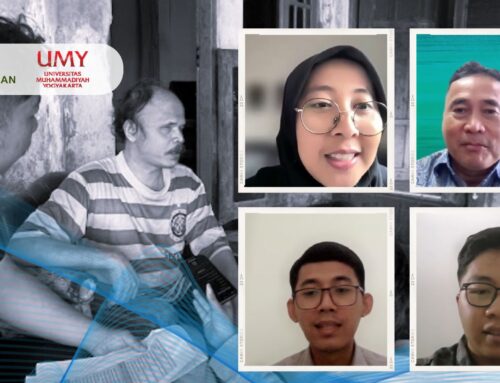FKP hosted by LPEM FEB UI with Nauli Desdiani (LPEM FEB UI) and Syahda Sabrina (LPEM FEB UI). Friday, 3 September, 2021.
KEY POINTS:
- COVID-19 pandemic has called upon many governments to implement countercyclical fiscal policy in the short term. However, the governments must be concerned about how to sustain their fiscal policy once the COVID-19 crisis has been under control and the economy has recovered. At the regional level, the COVID-19 pandemic has put many regions under serious economic pressure. Most regions in Indonesia are severely affected by the pandemic and they face difficulty to absorb the local budget and reallocate spending effectively.
- Finding strategies towards fiscal sustainability for local government while rebuilding fiscal resilience is needed in the aftermath of the crisis. There are some suggestions for policies that can be taken: building financial reserves during periods of economic expansion to prepare for an economic downturn, raising revenues from tax bases that will be the least detrimental to growth, take advantage of soft loans from government-related institutions, and develop municipal bonds to finance capital expenditure and improve fiscal decentralization and local autonomy.
SUMMARY
- COVID-19 pandemic has called upon many governments to implement countercyclical fiscal policy in the short term. Emerging countries often pursue pro-cyclical fiscal policy in which when the economy performs well, the government commonly increases its spending in the following year and vice versa. However, during this pandemic, the government around the world including Indonesia has adopted active fiscal measures to stimulate demand, since a procyclical fiscal policy will only lead to negative effects on output and social indicators. Nevertheless, a countercyclical fiscal policy only applies in the short term. The governments, including the Indonesian government, must be concerned about how to sustain their fiscal policy once the COVID-19 crisis has been under control and the economy has recovered. In this webinar, Syahda Sabrina and Nauli Desdiani from LPEM FEB UI presented their recent paper on local government budget resilience. This paper was awarded as one of the best papers of the IRSA International Conference in 2020.
- At the regional level, the COVID-19 pandemic has put many regions under pressure, especially Bali where the economic performance relies heavily on tourism activities. Meanwhile, certain regions also enjoyed positive growth amid unfavorable conditions which are mainly driven by primary sectors that remained operative during the outbreak and posted positive growth at the national level. Unfortunately, with the small proportion of local own-source revenue and additional spending to manage the impact of a pandemic, the positive growth may not be translated into a broader fiscal space in the local budget.
- Most regions in Indonesia (in total 23 provinces) were affected by the COVID-19 pandemic with government revenue and expenditure decreased by 16% and 18% respectively in the first semester of 2020. There are only three provinces that were able to implement a countercyclical fiscal policy in the form of a decrease in revenue and an increase in expenditure: Bali, West Papua, and Riau Islands. Most other regions in Indonesia are severely affected by the pandemic and they face difficulty to absorb the local budget and reallocate spending effectively.
- Although the crisis has made the local government rely on its local own-source revenue while facing a limited option for additional sources, 14 provinces, two of which East Java and Papua, managed to increase their local government revenue in the first semester of 2020 compared to 2019. The provincial government of Papua experienced an increase in its local own-source revenue by IDR 476 billion. The increase of Papua’s tax happened because it is the first time PT Freeport pays the surface water tax that accounted for 35% of the tax revenue. The government of Papua has also implemented tax and administrational breaks for vehicle and fuel tax. East Java also experienced an increase in their local own-source revenue by IDR 27 billion. The major contribution for East Java local own-source revenue comes from textile SMEs that diversify their product into a mask which is an essential kit needed during the pandemic period.
- Finding strategies towards fiscal sustainability for local government while rebuilding fiscal resilience is needed in the aftermath of the crisis. There are some suggestions for policies that can be taken: building financial reserves during periods of economic expansion to prepare for an economic downturn, raising revenues from tax bases that will be the least detrimental to growth (such as forestry, plantation, and mining property tax), take advantage of soft loans from government-related institutions (e.g. PT. SMI and/or Regional-Owned Enterprises which offer long tenor, relaxed terms, and very low-interest rates), and develop municipal bonds to finance capital expenditure and improve fiscal decentralization and local autonomy.





